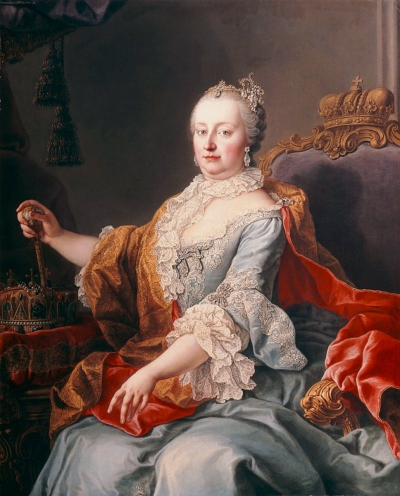The War of the Austrian Succession (German: sterreichischer Erbfolgekrieg), was a European conflict that took place between 1740 and 1748. Fought primarily in Central Europe, the Austrian Netherlands, Italy, the Atlantic and Mediterranean, related conflicts included King George's War in North America, the War of Jenkins' Ear, the First Carnatic War and the First and Second Silesian Wars.
Its pretext was the right of Maria Theresa to succeed her father Emperor Charles VI as ruler of the Habsburg monarchy. France, Prussia and Bavaria saw it as an opportunity to challenge Habsburg power, while Maria Theresa was backed by Britain, the Dutch Republic and Hanover, collectively known as the Pragmatic Allies. As the conflict widened, it drew in other participants, among them Spain, Sardinia, Saxony, Sweden and Russia.
Prussia occupied Silesia in 1740 and repulsed Austrian efforts to regain it, although Austria and Sardinia defeated Spanish attempts to regain their territories in Northern Italy. By early 1748, France had conquered most of the Austrian Netherlands but a British naval blockade was crippling their trade and the state was close to bankruptcy. The stalemate led to the Treaty of Aix-la-Chapelle (1748) which confirmed Maria Theresa in her titles but failed to resolve underlying tensions between the signatories, many of whom were unhappy with the terms. France achieved minimal gains for vast expenditure, while the Spanish failed to recover Menorca or Gibraltar, ceded to Britain in 1714.
The clearest winner was Prussia, which acquired Silesia from Austria, an outcome that undermined the long-standing Anglo-Austrian Alliance, since Maria Theresa deeply resented Britain's insistence she cede Silesia to make peace and whose main objective became regaining it. The war also demonstrated the vulnerability of Hanover, then held in personal union with the British Crown, while many British politicians felt they had received little benefit from the enormous subsidies paid to Austria. The result was the realignment known as the Diplomatic Revolution, in which Austria and France ended the FrenchHabsburg rivalry which had dominated European affairs for centuries, while Prussia allied with Great Britain. These changes set the scene for the outbreak of the Seven Years' War in 1756.
Maria Theresa Walburga Amalia Christina (German: Maria Theresia; 13 May 1717 – 29 November 1780) was a ruler of the Habsburg dominions from 1740 until her death in 1780, and the only woman to hold the position. She was the sovereign of Austria, Hungary, Croatia, Bohemia, Transylvania, Mantua, Milan, Lodomeria and Galicia, the Austrian Netherlands, and Parma. By marriage, she was Duchess of Lorraine, Grand Duchess of Tuscany and Holy Roman Empress.
Maria Theresa started her 40-year reign when her father, Emperor Charles VI, died in October 1740. Charles VI paved the way for her accession with the Pragmatic Sanction of 1713 and spent his entire reign securing it. He neglected the advice of Prince Eugene of Savoy, who believed that a strong military and a rich treasury were more important than mere signatures. Eventually, Charles VI left behind a weakened and impoverished state, particularly due to the War of the Polish Succession and the Russo-Turkish War (1735–1739). Moreover, upon his death, Saxony, Prussia, Bavaria and France all repudiated the sanction they had recognised during his lifetime. Frederick II of Prussia (who became Maria Theresa's greatest rival for most of her reign) promptly invaded and took the affluent Habsburg province of Silesia in the seven-year conflict known as the War of the Austrian Succession. In defiance of the grave situation, she managed to secure the vital support of the Hungarians for the war effort. During the course of the war, Maria Theresa successfully defended her rule over most of the Habsburg Monarchy, apart from the loss of Silesia and a few minor territories in Italy. Maria Theresa later unsuccessfully tried to recover Silesia during the Seven Years' War.
Though she was expected to cede power to her husband, Emperor Francis I, and her eldest son, Emperor Joseph II, who were officially her co-rulers in Austria and Bohemia, Maria Theresa was the absolute sovereign who ruled with the counsel of her advisers. Maria Theresa promulgated institutional, financial, medical and educational reforms, with the assistance of Wenzel Anton of Kaunitz-Rietberg, Friedrich Wilhelm von Haugwitz and Gerard van Swieten. She also promoted commerce and the development of agriculture, and reorganised Austria's ramshackle military, all of which strengthened Austria's international standing. However, she despised the Jews and the Protestants, and on certain occasions she ordered their expulsion to remote parts of the realm. She also advocated for the state church.

 English
English  español
español  français
français  português
português  русский
русский  العربية
العربية  简体中文
简体中文 
